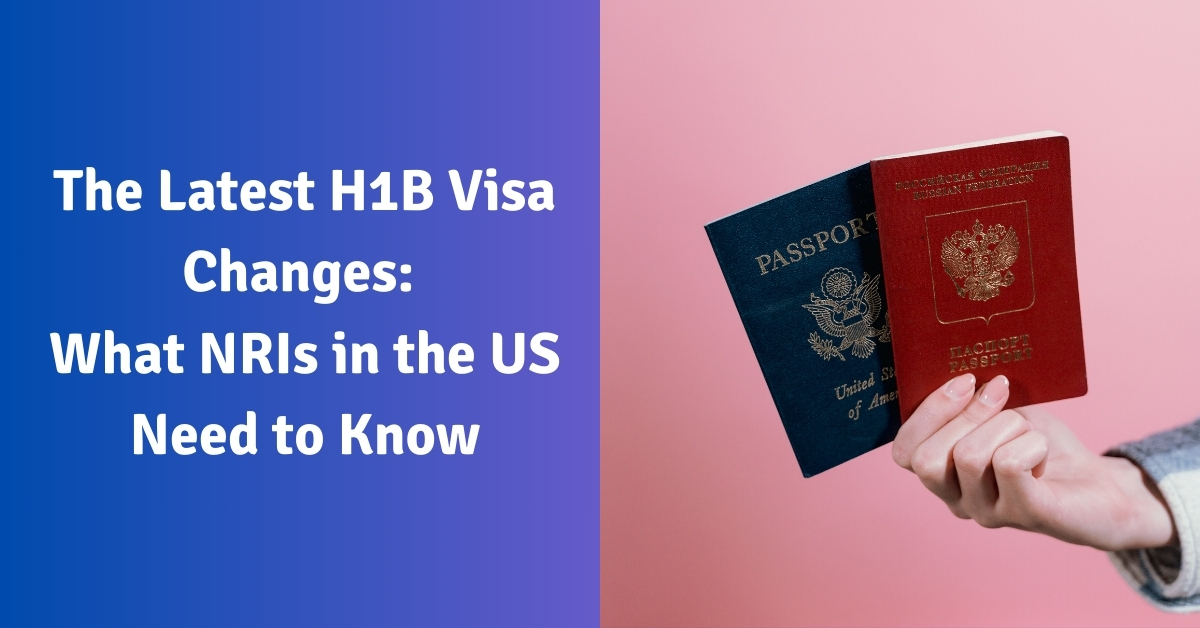The Latest H1B Visa Changes: What NRIs in the US Need to Know

Years passed in the H1B visa serving as a lifeline for Indian professionals looking for stability and growth within the U.S. However, the recent H1B visa changes have become a shock for the NRI community, especially among thousands of Indian professionals whose hope for a stable future is not so certain today. With an Indian population representing more than 70% of all H1B visa holders, such changes have been highly consequential.
In this blog, we shall discuss how the recent changes to the H1B visa might impact NRI living and working in the United States, along with actionable strategies to protect your career and financial future.
The H1B Visa: A Birds-Eye View
Long recognized as the golden ticket for skilled professionals to work in the U.S., over 500,000 H1B visas remain active as of 2024. Indians retain more than 70% of all those. But it’s now expected that new proposals introduced by USCIS may well bring new barriers into the scheme for NRIs.
Eligibility criteria and selection processes, all visa renewals and extensions are affected. Changes are also there in the policies for dependents, especially all those who have H4 visas, as most of them work and help their families earn.
Important Changes in the H1B Visa Procedure
- Changes in Lottery Systems Earlier, several employers could apply for the same candidate, which increased their chances of getting selected in the lottery. The new system is individual-specific, rather than employer-specific, from fiscal year 2024. Though this shuts the loopholes, it also decreases the chances for many NRIs, especially those using consultancies to increase their chances.
- Tougher Documentation Standards The USCIS has got stricter documentation norms, and this has increased the RFEs. According to Forbes, 20% of the H1B applications received RFE last year; this percentage will soar in the coming years. The middle-level and consulting jobs will face much rejection as it follows the new stricter norms.
- H4 Visa Holders at Risk Currently, 36% of H4 visa holders spouses of H1B visa holders are employed in the U.S. However, the Biden administration has hinted that it would modify policies that permit work authorization for H4 visa holders, thereby perpetuating further economic uncertainty for those families that survive on two salaries.
- Renewal and Extension Delays Renewals and extensions of visas are more difficult procedures now. Bloomberg reports reveal delays and rejections increasing up to 15% from a year ago. This is sending many NRIs away from the U.S. for temporary periods to wait for clearance, resulting in loss of employment and an uncertain future within the country.
How Changes Affect NRIs
For many NRIs in the U.S., these changes pose major challenges in terms of job security, financial stability, and long-term planning. Families who have based their finances on dual incomes are the most vulnerable, and stricter norms are going to affect consulting roles the most.
With more RFEs and rejections, NRIs should be prepared for delays in visa approvals and possibly being forced to return to India temporarily.
Action Plan to Protect Career and Wealth
- Develop Alternate Sources of Income To cope with uncertainties in the job market of the U.S., some kind of fallback strategy is crucial. Investing in India can serve the purpose, even in the forms of mutual fund, PMSS, or property investment. If visa issues call for a return, all these investments are safe.
- Ensure that Sufficient Insurance Coverage is Provided Ensure that you have good term life insurance and health insurance in India to protect your family in case of anything.
- Other Visas Consider alternative immigration options, such as the EB-5 investor visa, which is a visa that offers a clear route to residency and citizenship in the U.S. through investments.
- Stay Current on Policy Changes With policy shifts likely to accelerate under the next administration, staying informed about new developments is crucial. These changes could come rapidly, especially if there is a change in leadership.
Conclusion
Under these new circumstances, the H1B visa process is significantly tougher and more competitive, with the added uncertainty of a ceiling. Building a safety net to ensure your family’s future is perfectly possible through proactive steps such as diversifying income, securing insurance, and finding other visa options. After all, when in America, the land of dreams, financial security doesn’t necessarily depend on it.
FAQS
- What are the key changes in the H1B lottery process?
Ans- The lottery is now individual-based rather than employer-based, reducing the chances of selection for many NRIs.
- How have documentation norms changed for H1B applicants?
Ans- Stricter norms have been introduced, leading to a rise in RFEs (Requests for Evidence) and making it harder for consulting and mid-level roles to be approved.
- How will the new rules affect H4 visa holders?
Ans- The Biden administration may revise policies that allow H4 visa holders to work, which could reduce dual-income households.
- What are the chances of H1B visa renewals being rejected?
Ans- There has been a 15% increase in delays and rejections for visa renewals, making it harder to stay in the U.S. without interruption.
- What alternative visa options are available for NRIs?
Ans- The EB-5 investor visa offers a path to permanent residency through investment in the U.S.
- How can NRIs diversify their income streams?
Ans- NRIs can invest in India through mutual funds, PMSS, and real estate to create backup financial plans.
- Why is term life insurance important for NRIs?
Ans- Having life and health insurance ensures financial protection for your family in case of unforeseen circumstances.
- What should NRIs expect regarding visa documentation?
Ans- NRIs should be prepared for increased scrutiny and the need to provide extensive proof of specialized skills.
- Can NRIs return to India if their H1B visa renewal is delayed?
Ans- Yes, some NRIs may have to leave the U.S. temporarily due to delays in the renewal process.
- Is the H1B visa process likely to get easier soon?
Ans- With the upcoming U.S. elections, further changes could be implemented, so staying updated is essential.
Disclaimer: The information provided here is for educational and informational purposes only and should not be construed as financial, legal, or tax advice. Consult with a qualified professional before making any investment decisions. We do not accept any liability for errors or omissions in this




